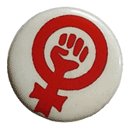- clearly stated, and principled.
- warranted users with a visible connection to their lived bodies: anonymity breeds hate; the loss of the body erases the politics of identity, place, and society
- hierarchies as needed: leaders, mentors, organizers, builders are needed
- shared authoring: yet every user is allowed the full authority of her voice
- shared language: a common vocabulary, connected to a feminist analysis or positionality (or from other political movements) allows for facility of conversation, as well as a sense of community
- shared political beliefs: a common set of beliefs about the world, and how it might change, are the foundation for change.
- collaboration: users should encounter possibilities to do things together
- respect: is a baseline for interaction
- process: discussions about how things are done, how things feel, how things could be better experientially are understood as central to the workings and content of the site
Please note, there is one important parameter for each of these conditions: while each must be present for a site to create possibilities for feminism, none can be fixed, immutable, or inaccessible. Instead, each of the principles listed must be linked to a transparent method that allows them to be open to question, debate, change, and participate in their ongoing construction.

